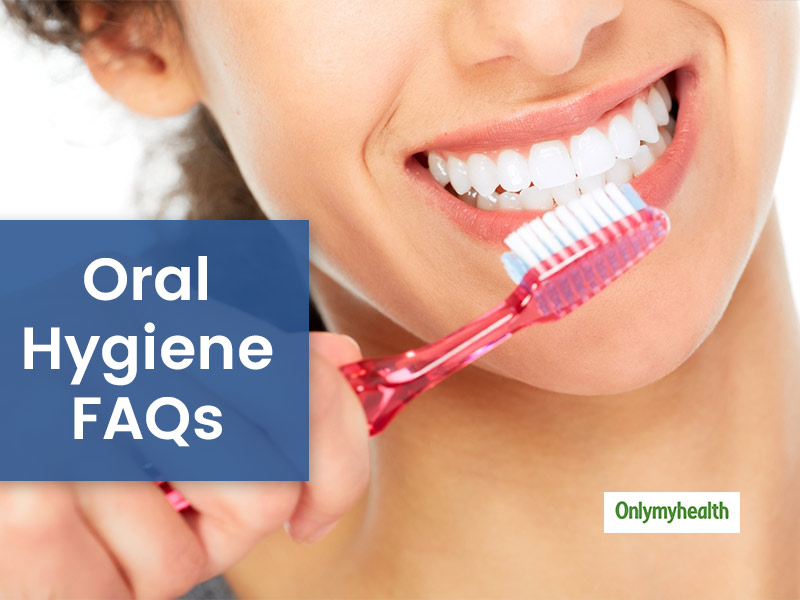
Oral hygiene myths have lived for years and passed down from generations to another. Some information may be available on print or online regarding tips for proper oral care. Unfortunately, much of it may be false or misleading. I wish to share the truth about these common oral hygiene myths that I get to hear from patients often. Onlymyhealth spoke to Dr Vidya Saraswathi M of Manipal College of Dental Sciences, Manipal Academy of Higher Education on the various myths and facts that one should know about oral hygiene.
Table of Content:-
Myth 1: Sweets and sugar are solely responsible for dental cavities
Myth 2: Brushing harder and brushing with hard-bristled toothbrush cleans better
Myth 3: Do not brush or floss for a few days if you have bleeding gums
Myth 4: Flossing does not help in oral hygiene practices but leads to spacing between the teeth
Myth 7: Putting a cap on your toothbrush protects it from bacteria
Myth 8: It is a good practice to brush teeth immediately after eating
Myth 10: Professional cleaning of teeth every 6 months is recommended
Myth 1: Sweets and sugar are solely responsible for dental cavities
Fact: High sugar intake, especially processed sugar will enhance the risk of tooth decay. However, even if you do not consume a lot of sugar in your diet, you will still be at risk if you do not brush and floss correctly. It is not the sugar itself that causes decay. Certain bacteria in the mouth act on dietary sugar, releasing acids which in turn result in the dissolution of enamel, the hard protective outer layer of tooth to initiate cavities.

Also Read: Good Oral Hygiene Practices According to Your Age
Myth 2: Brushing harder and brushing with hard-bristled toothbrush cleans better
Fact: Absolutely wrong! Rather it can be counterproductive. The harder you brush, the more damage to the tooth enamel leading to untimely loss of tooth structure. Also, soft tissues surrounding the tooth(gums) get bruised, causing gum recession. Therefore, gentle strokes with soft-bristled brushes are best recommended. Brush gently with circular motions holding the toothbrush in 45-degree angle to your teeth
Myth 3: Do not brush or floss for a few days if you have bleeding gums
Fact: Bleeding gums during brushing or flossing is due to inflammation of the gums. The reason behind this is plaque or tartar build-up causing gum disease. Bleeding gums could be a reflection of problems related to your general health. Continue oral hygiene practices and meet your dentist for guidance.
Myth 4: Flossing does not help in oral hygiene practices but leads to spacing between the teeth
Fact: Flossing removes plaque and food stuck between two adjacent teeth. It true that flossing is not required if two adjacent teeth are in close tight contact. However, regular flossing helps in improved oral health, if there is gingival recession or spacing between teeth leading to plaque or food particle retention.
Myth 5: Oral disease is only a concern for the mouth
Fact: This popular notion has misled many individuals. The bacteria present in the mouth, especially in the gums can spread to other parts of your body. Recent scientific studies have found corelation between gum disease and heart disease, diabetes mellitus and few forms of cancer. Oral health is connected to the rest of the body
Also Read: 5 Ayurvedic Tips And Tricks For Oral Health
Myth 6: With advancing age, teeth become unhealthy
Fact: Younger age does not mean teeth will be healthy as younger individuals who have not taken good care of their teeth have lost their teeth at a very young age. People who maintained good oral hygiene practices during their childhood and adult life will still have healthy teeth in their senior years.

Myth 7: Putting a cap on your toothbrush protects it from bacteria
Fact: The truth is that toothbrush needs to be dry to prevent breeding of bacteria on the bristles. To avoid swapping of germs never keep your brush close to others’ toothbrushes. At any rate capping is to be avoided. Rinse the brush clean after every use and let it dry between brushings.
Myth 8: It is a good practice to brush teeth immediately after eating
Fact: The acid content in the drinks and food you consume has the tendency to soften the enamel. Brushing immediately after meal is likely to damage the softened enamel. Therefore, it is good to wait for30 minutes so that saliva dilutes and removes the acid content before you brush.
MYTH 9: Mouthwash can replace brushing and flossing
Fact: Mouthwash is just a short-term solution for fresher breath and bacteria removal. Be aware, only toothbrush and floss can properly remove food particles and plaque from your teeth.

Also Read: World Oral Health Day 2020: How to Take Care Of Your Child’s Teeth
Myth 10: Professional cleaning of teeth every 6 months is recommended
Fact: Yes, you need to visit a dentist in regular intervals as ‘Prevention is better than cure’. However, whether you need a professional teeth cleaning or not can only be decided by your dentist upon checking your teeth. Tartar and plaque formation occur at different rates in different people. Therefore, a few may need teeth cleaning once a year, others – more often. Go by your dentist’s advice
Be proactive and keep your mouth healthy. Visit your dentist regularly and spare a little time everyday towards maintaining good oral health. This will save you countless hours of trouble in the future.
With inputs from Dr. Vidya Saraswathi M, Associate Dean, Professor, Dept. of Conservative Dentistry & Endodontics, Manipal College of Dental Sciences, Manipal Academy of Higher Education
Read more articles on Other Diseases
Also watch this video
How we keep this article up to date:
We work with experts and keep a close eye on the latest in health and wellness. Whenever there is a new research or helpful information, we update our articles with accurate and useful advice.
Current Version